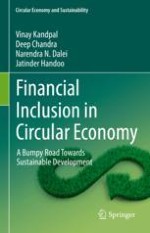This book presents an assessment of endeavors towards Financial Inclusion and its role in Sustainable development. An attractive feature is that it deals with almost all the contemporary issues essential for reaching UN Sustainable Development Goals. This book would be an exclusive and authentic source to the students of undergraduates, postgraduates and professional courses in Commerce and Management. This manuscript is divided into nine chapters.
The book looks at various salient topics, including financial inclusion measurement, the impact of various financial inclusion indicators on development outcomes and macroeconomic volatility using aggregate data, and the effects of financial inclusion on poverty and development outcomes using microdata. Using the recently adopted Sustainable Development Goals as an overall framing of the issues, it exhibits how poor and disadvantaged women and men can be bankable if the adequate facilitation for maximizing opportunities and addressing constraints. This book attempts to cover different dimensions of Financial Inclusion towards attaining Sustainability and Circular Economy through financing instruments and investments. This book highlights different goals of UN SDG as an Initiative towards Inclusive Growth and Circular Economy, which is also influenced by Micro Finance Institutions and NBFCs.
This book will be an indispensable source for the Students of PG and UG programs, Researchers and practitioners from areas of Commerce, Economics and Management and the faculty members and professionals like bankers and financial consultants. We hope this book will meet the requirement of all the categories of readers.
